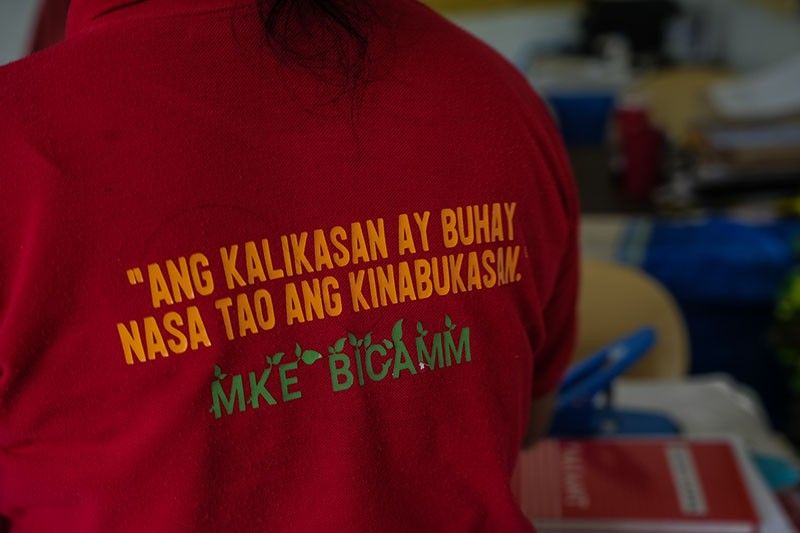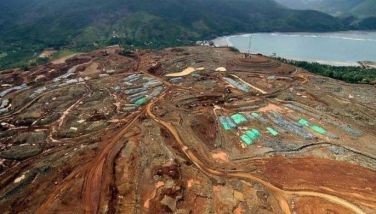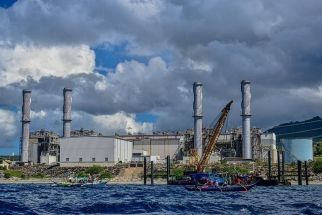Philippines faces challenges in balancing green energy needs with community rights

Second of a two-part special report on extraction of critical minerals. Read the first story here.
BROOKE’S POINT, Palawan (Update 1: December 14, 7:02 p.m.) — Eframil Landuan, 23, fondly recalled his community in Sitio Sabsaban in Barangay Ipilan as a place where he shared a tight bond with his fellow Palaw’ans. Their lives revolved around agricultural practices and rich traditions, and were supported by the rivers and mountains.
However, this simple but idyllic existence was disrupted when mining firm Ipilan Nickel Corporation started its operations in his hometown of Brooke’s Point. Landuan observed that this not only led to a division of their views but also fractured the unified fabric of their community.
“Some community members want the project, but we don’t want it because we are protecting our homes. We were born there, grew up there. That’s the life we’ve known,” Landuan said in Filipino.
While the extraction of nickel—a key component of clean energy technologies—in their town promises economic and social benefits and contributes to the global energy transition, it throws the lives of Palaw’an indigenous community into uncertainty and fear.
“What more culture do we have to pass on, our way of life inherited from our ancestors? What else can we impart to [the next generation] if the fields are gone, the mountains leveled, and the water is no more?” Landuan asked.
Experts say the situation in Brooke’s Point, and other communities hosting or located near mines for critical minerals such as Sibuyan Island in Romblon and Homonhon Island in Eastern Samar, highlights the need for transition that goes beyond simply switching to cleaner technologies, but one that is just and equitable.
Mining transition minerals

Abandoning coal, oil and gas in favor of cleaner energies such as solar and wind, along with technologies like electric cars, is essential if the world is to meet the goal of capping global warming to 1.5 degrees Celsius and avoiding the most catastrophic impacts of climate change.
The Philippines is the fifth most mineral-rich country in the world, hosting the fifth-largest nickel and fourth-largest cobalt and copper reserves. Despite the archipelago’s abundant mineral resources, mining contributes less than 1% to the country’s gross domestic product.
The government aims to revitalize the mining industry to attract investments and spur economic recovery from the COVID-19 pandemic. It has lifted restrictive mining policies, including the ban on open-pit mining, and increased support for the industry by leading exploration activities to identify where critical minerals can be extracted.
The Philippines is also aspiring to become a hub for minerals processing, as well as the production of renewable energy systems, electric vehicles, and battery components.
The country is “well-positioned to contribute significantly to facilitating the transition toward low-carbon, clean energy technologies,” the environment department’s Mines and Geosciences Bureau (MGB) told Philstar.com.
“With the implementation of proactive mining policies and robust coordination between the government and industry stakeholders, the Philippines can achieve new developments, heightened environmental and social safeguards, and increased economic contributions,” the MGB said.
However, Legal Rights and Natural Resources Center (LRC) advocacy coordinator Maya Quirino stressed the need for energy transition minerals “does not justify mining.”
“It doesn’t mean that if you’re going to get into renewable energy, you can mine all you want, especially because in the Philippines we have at least five energy transition minerals,” Quirino said.
'Just' in green shift
Transition minerals are predominantly concentrated in or around indigenous territories worldwide. A paper published by LRC revealed that 60% of mineral deposits and 49% of mining projects in the Philippines are located in ancestral lands.
The extractive sector is also associated with human rights violations and the killings of environmental defenders. According to watchdog Global Witness, one-third of the around 281 land and environmental defenders killed in the Philippines since 2012 were opposing mining operations.
“Large-scale mining areas in the Philippines host the highest poverty incidence in the archipelago and are frontline to the world’s most severe natural disasters,” said Beverly Besmanos, national coordinator of Bantay Kita, a coalition of organizations advocating for transparency and accountability in the extractive industry.
Palaw’an youth Landuan fears a repeat of the destructive flooding and landslides that struck Brooke’s Point in late 2022 and January of this year if mining operations persist in their town.
According to Besmanos, the Philippines faces challenges in managing the transition minerals sector, such as the weak implementation and enforcement of social and environmental safeguards in areas where these minerals are sourced, coupled with insufficient capacities of host communities and local governments to meaningfully participate in mining governance.
Additionally, the absence of effective government platforms and processes hinders open discussion and engagement along the green technology supply chain and clean energy transition.
“Transition mineral mining in a just transition is one that upholds mining accountability between institutions, specifically ensuring human and environmental rights due diligence is upheld throughout the green energy supply chain,” Besmanos said.
“It is always to ask—who will the energy transition benefit? And who holds the justice in the “just” energy transition?” she added.
No-go zones

Groups like LRC have been calling on lawmakers to repeal Republic Act 7942, or the Philippine Mining Act of 1995. “There are a lot of problems in mining because it stems from the fact that the law is weak,” Quirino said.
LRC recommends that the government adopt a “just minerals transition” policy framework outlined in the proposed alternative minerals management measure. This plans the minimum metallic material requirement for the country’s clean energy transition, and empowers host communities in various mineral governance processes.
Quirino said the proposed just minerals transition entails that communities and local governments are included in the planning phase of projects and have the authority to decide on all mining and transition-related projects, not the national government.
“Communities know more intimately what’s happening in terms of ecosystems because they live there. Since indigenous peoples own resources within ancestral domains, they ought to also be making decisions whether to open these mining areas to mining or not,” Quirino said.
Under the proposal, old growth forests, mangrove forests, prime agricultural lands, critical watersheds, habitats, climate-vulnerable areas, small-island ecosystems, sacred sites, and burial grounds are off-limits to mineral development.
Victor Colili, a Palaw’an and a councilor of Brooke’s Point, said the area being mined in their town is a natural forest and a protected area, making it a “core zone.” Under Republic Act 7611 or the Strategic Environmental Plan for Palawan Act, core zones should be fully and strictly protected and maintained free of human disruption.
The MGB said the government will curb mineral explorations in ecologically sensitive zones, such as protected areas, forest reserves, national parks, and other areas closed to mining applications, as well as in areas prohibited by the National Integrated Protected Areas System (NIPAS).
It said the environment department can utilize advanced technologies and remote sensing techniques to mitigate potential environmental effects of exploration activities. Additionally, geochemical sampling and geophysical surveys can be employed to minimize the need for extensive drilling, excavation, and extraction.
“The department is also currently in the process of formulating comprehensive guidelines pertaining to environmental impact assessment of exploration activities and streamlining and enhancing the review process for exploration work programs and their corresponding environmental work programs,” the MGB said.
Benefit sharing
Another principle of a just transition is the concept of beneficial sharing and ownership.
Quirino noted that indigenous people communities, who give their consent to projects operating in their ancestral lands, often receive a royalty share equivalent to only 1% of the gross sales of mining companies.
“What they receive from these projects is minimal, considering that they bear the negative externalities,” she said. “In a just transition, whether in energy or minerals, they should receive more.”
LRC advocates for a 10% royalty share for indigenous peoples and an additional 10% share from excise taxes to local governments hosting mining projects.
In September, the House of Representatives passed a proposed measure enhancing the fiscal regime for the mining industry. The bill aims to impose a 4% royalty on the gross output of large-scale mining operations within mining reservations, marking a decrease from the existing 5%.
Once the bill becomes a law, a margin-based royalty on income from mining operations will be imposed on large-scale mines outside mineral reservations. Small-scale mining operations will be subject to a royalty rate of one-tenth of 1% of the gross domestic output.
The Senate has yet to come up with its version of the proposed legislation.
Anti-mining group Alyansa Tigil Mina earlier said the House bill “defeats the original purpose of a new fiscal regime, which is to raise revenues from mining.”
‘Don’t repeat past mistakes’

At the COP28 climate summit in Dubai, United Nations Secretary-General António Guterres announced his plan to set up a panel on critical energy transition minerals as the demand for such minerals is set to increase nearly fourfold by 2030.
The proposed panel aims to bring governments, international organizations, industry players, and civil society to develop common and voluntary principles to guide extractive industries in the years ahead “in the name of justice and sustainability.”
“We cannot repeat the mistakes of the past with a systematic exploitation of developing countries reduced to the production of basic raw materials,” Guterres said.
Young Palaw’ans like Landuan and 23-year-old Jean Banadan recognize the role of minerals like nickel in the technologies they use. However, they argued that it should be extracted in an area more suitable for such activities, and for them, Brooke’s Point is not that area.
Nearly a year after locals set up a barricade to try to stop INC’s operations, the firm continues to extract nickel ore from their land. Their operations persist despite cease and desist orders from the local government and the National Commission on Indigenous Peoples.
For Palaw'ans, this means that their fight to end mining in Brooke’s Point is far from over. Landuan and Banadan will soon take on the roles of their elders in upholding environmental protection.
“We need to fight for our rights and principles so that the next generation can still inherit the environment they also wish to cherish,” Banadan said.
— This story was supported by Climate Tracker Asia and Oxfam.
- Latest






























